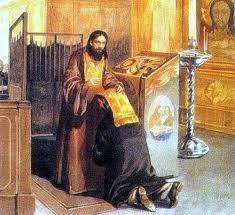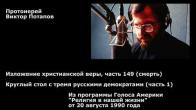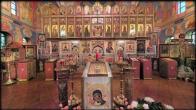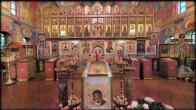You are here
Repentance: Life's Continual Effort

Bishop Ignaty Brianchaninov left us the following precious instruction: "In order to live spiritually and draw breath from grace, we must continually exhale the ashes of sin." We sin almost constantly, if not in our deeds, then in our thoughts and feelings. Therefore it is essential to continually cleanse our souls. In the language of asceticism (teaching on religious struggle) it is known as "internal activity" or "attentiveness." To continually repent is to pay unceasing attention to one’s spiritual life, to assess and remove from it all that is questionable and foolish. Bishop Theophanes the Recluse teaches us that one should do battle with sin at the moment it is born, i.e. when it is only in one’s thoughts. This is true battle, the " invisible warfare" as it is called by the Athonite struggler Nicodemus of the Holy Mountain. This spiritual battle requires ability, God’s assistance, and constant prayer. As the holy Fathers of the Church write " It is pointless to weep over the sins of the past if we do not struggle with them in the present." Continual repentance or attentiveness is that poverty of spirit of which Christ speaks in the first Beatitude in His sermon on the mount. The call to such repentance is found throughout the Word of God and the texts of Orthodox worship.
In a sense, all of the teaching of the Church is a single call to repentance in the most profound sense of that term, i.e. it is a call to rebirth, to a complete reassessment of all values, to a new understanding and vision of life in the light of Christ.
It was not coincidentally that St. John the Baptist often repeated the words "Repent, for the Kingdom of Heaven is at hand." The Christ began His sermon with these same words. According to the Venerable St. Ephraim the Syrian, "repentance is a field to be cultivated at all times. "Repentance is the tree of life, resurrecting those dead in sin." Elsewhere he states, "Through repentance, earth has become heaven, for it has become filled with saints."
In his book A Priest’s Observations, Fr. Alexander Elchaninov, an experienced spiritual director, writes, "Without our constant control over the spirit, confession, which takes place occasionally, is not successful. The eye of the spirit, conscience, demands exercise, and without it you will see neither yourself nor your sins. According to the Venerable St. Isaac of Syria, " He who has been able to see himself has accomplished more than one who has seen the angels." He also wrote "One who apprehends his sin is better than one who through his prayers raises the dead."
Sts. Ephraim and Isaac, and other spiritual strugglers after piety all recommend that in doing battle with sin, it is best to begin with the sin which most grievously attacks us. To the extent that we are rid of it, our conscience will see all the more. Moreover, it always behooves Christians to do battle against those sins which directly oppose love. The holy fathers of the Church teach that hatred, enmity, and condemnation utterly seal shut the gates of the Kingdom of God, the Kingdom of love. Thus, the first condition of true repentance is reconciliation with everyone. This is why in the Lord’s Prayer, the Christ included the words "forgive us our debts as we forgive our debtors." This is why the Orthodox Church begins Great Lent with Forgiveness Sunday, when believers ask forgiveness of one another for personal insults and offenses, so that with a clear conscience they might begin Lent, their "invisible warfare." The Church teaches that true love is indivisible, and that dislike for a single person will ultimately poison all love. Theophanes the Recluse writes: "In one who is at odds with anyone else, all friendship is fragile, and easily turns into enmity; of course, by bearing enmity, one cannot really love God. God is complete love, and tolerates nothing that is opposed to love."
The commandments in the Gospel, while easy, appear difficult, for human consciousness, having fallen out of synch with life and harmony, is clouded. For example, people consider the Gospel commandment to love friend and enemy alike, to be difficult. In the sermon on the mount, the Lord says: "Love your enemies, bless them that curse you , do good to them that hate you, and pray for them which despitefully use you and persecute you" (Matt. 5:44). We see that no limits to good are imposed upon man in this commandment, one given to those who wish to rise above both their own and mankind’s selfishness, to be healed, and to depart from the state of sin.
Let us try to list those who have caused us some annoyance or insult, who have dealt with us poorly or spoken ill of us. In other words, let us recall those who are "not to our liking" and, forgiving each of them, let us sincerely pray for these souls. Let us drive out any grudge or irritation we bear them, and wish them well. Given the opportunity, let us say something nice about them to others. At every opportunity, let us help them.
Thus, as we will see for ourselves, fulfilling the commandment of love will engender a joyous feeling of spiritual freedom and profound peace. Many internal difficulties will depart from us, for we will have fulfilled the Christ’s words, believed in God, and given Him heed. The power of good will rejoice within us. Even if we do not immediately notice this peace within ourselves, it will certainly come to us as a reflection of our charity.
That a person is kind, honest, and generous always seems miraculous. Yes, it is a miracle, and a miracle far greater than moving a mountain. Something greater than a mountain is being moved - human selfishness. Such is the effect on man of our faith in God , our trust in the Lord, our repentance before Christ. When one who hates becomes one who loves, when a liar becomes truthful, when a vain person becomes modest, it is truly a miracle. Charity emanating from us first of all liberates us from our own evil; it opens within us the doors and windows through which flows the pure air of heaven. This is the rebirth born of repentance.
In repentance we see the operation not of natural forces but of supernatural grace-filled ones. And only one who believes in the Light can take into himself true love. According to biological law, men engag only in a "struggle for survival." But according to the law of the Spirit, the battle is for the resurrection of the world, a spiritual battle which conquers selfishness, spiritual death. The Christ calls us to overcome our evil will and animal nature, to become human in the full spiritual sense of the term. The human soul is immeasurably greater than matter. As the Apostle Paul tells the Philippians, "I can do all things through Christ which strengtheneth me." Such great, marvelous words: "I can do all things through Christ which strengtheneth me." Through the faith granted us, we are called to be centered internally, mentally, not on our little selfish personality, but on the power of the Living God, the True Christ Jesus Who dwells in us.
The Creator and Father who brought us into being granted to our souls the freedom to make a free moral choice, to turn to Him and to repent of our sins, which constitute a betrayal of God’s truth. Yes, man is sometimes unfaithful to God; even if we do not frankly renounce God, we sometimes obliquely become betrayers of Christ, of His love and truth. Let us all repent of that.
Let us reflect upon how imperfect is our consciousness, and let us repent before God. Through repentance, the pure path to God is opened. Moreover, let us not tarry, for no one knows when his final hour will come. There is nothing more important and more needed than repentance and God’s saving forgiveness.
PARISH LIFE
Address of our Cathedral
Subscribe to our mailing list
While all the materials on this site are copyrighted, you may use them freely as long as you treat them
with respect and provide attribution on the Russian Orthodox Cathedral of St.John the Baptist of Washington DC.









